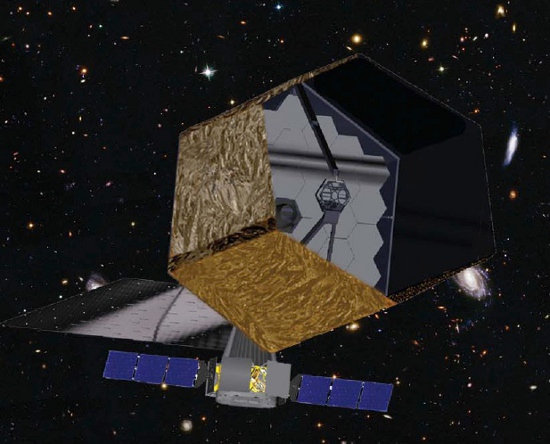Predictions about the future of science and technology are notorious for turning out to be wrong. There is a story (possibly apocryphal) that in 1894, a writer in the London Times estimated that in 50 years the streets of London would be buried under nine feet of horse manure from all the horse-drawn cabs and buses (there were about 11,000 cabs in London at the end of the nineteenth century).
Nevertheless, we know of at least a few topics that will undoubtedly be active areas of research for the next half-century. In my own field of astronomy and astrophysics, the search for extraterrestrial life is arguably the most intriguing endeavor. Upcoming and proposed facilities such as the James Webb Space Telescope and a next generation of large optical telescopes in space (Figure 1) will take important steps in this quest, as will missions to planets and satellites in our own solar system. It is quite likely, however, that even before alien life is found, biologists will succeed in creating synthetic life in the laboratory (see Creating Life in the Lab). At the same time, in the arena of post human-genome-sequencing science, biologists will strive to understand precisely how the genetic code triggers and directs other life-related processes, such as the construction of proteins (Figure 2). A deeper understanding of the genome and how it functions could perhaps lead to a substantial--even dramatic--extension of the human lifespan.

Figure 1. Potential design for ATLAST, a 16-meter segmented space telescope to explore biosignatures in optical/ultraviolet light in extrasolar planets. Credit: Northrop Grumman Aerospace Systems and NASA/STScI.

Figure 2. The so-called "Alpha Helix" which is part of the structure of many proteins. Credit: Pam Jeffries. Reproduced with permission.
Returning from the complex to the fundamental, one major question that will almost certainly preoccupy scientists in the next few decades is the synthesis of General Relativity with quantum mechanics. Finding a theory of space-time and gravity that is fully compatible with the quantum principles has so far eluded physicists. Along the way, with the help of astronomers, physicists will also unquestionably attempt to elucidate the nature of the Dark Energy that propels the accelerating cosmic expansion. Additionally, if the experience with string theory (the idea that subatomic particles represent vibration modes of tiny loops) can be any guide, the formulation of a unified theory of quantum gravity will require the development of mathematical tools that are not currently available.
I do not wish to make any predictions in the areas of computer science and information technology, simply because progress in those fields has reached such a breakneck pace, that any forecast is likely to appear ridiculous even a mere decade from now. I will only note that the combined efforts on understanding the operation of the human brain and on "smart" computers are likely to produce artificial intelligence machines capable of unimaginable feats in the not-too-distant future.
Progress will not be free of risks. We have already gotten a glimpse of what climate change, shortages of food or energy, failure of electrical grids, or cyber-attacks can do. These problems will not go away. Rather, in the absence of serious preventative actions, they will only get worse. Many ethical questions will also need to be addressed, as questionable procedures (such as human cloning) will become feasible. This is not a reason for panic. In the same way that human ingenuity can produce advances in science and technology, it can also be harnessed (in principle, at least) to confront environmental and ethical challenges.
?
?
?
Follow Mario Livio on Twitter: www.twitter.com/Mario_Livio
"; var coords = [-5, -72]; // display fb-bubble FloatingPrompt.embed(this, html, undefined, 'top', {fp_intersects:1, timeout_remove:2000,ignore_arrow: true, width:236, add_xy:coords, class_name: 'clear-overlay'}); });Source: http://www.huffingtonpost.com/mario-livio/science-in-the-21st-centu_b_2768249.html
mexico city earthquake stand your ground law dancing with the stars season 14 david garrard michael bay ninja turtles san antonio weather mike daisey
No comments:
Post a Comment
Note: Only a member of this blog may post a comment.